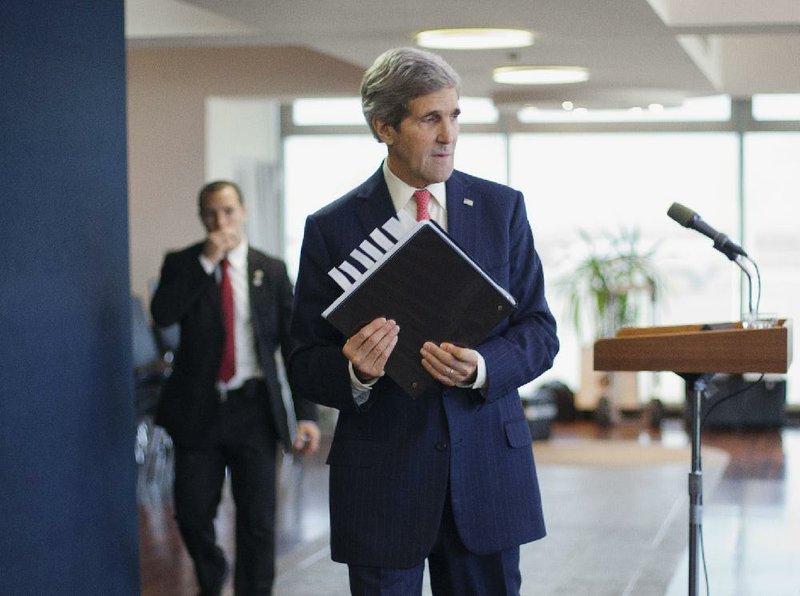TEL AVIV, Israel - Invoking the memory of Nelson Mandela, the South African statesman who died Thursday, U.S. Secretary of State John Kerry said Friday that “we are closer than we have been in years” to a peace agreement between Israel and the Palestinians.
“The example of Nelson Mandela is an example that we all need to take to heart,” Kerry said as he departed after his eighth visit to the region since April in hopes of forging a two-state solution to the long-running conflict.
“The naysayers are wrong to call peace in this region an impossible goal,” he added. “It always seems impossible until it is done.”
There have been no public signs of significant progress in the negotiations Kerry initiated four months ago, and he declined Friday to cite specific examples of what he had accomplished in his meetings over the past two days with Prime Minister Benjamin Netanyahu of Israel and Palestinian president Mahmoud Abbas, citing the need to protect the confidentiality of the talks.
Kerry said that the security “concepts” that John Allen, the retired Marine general, had presented to both leaders were based on consultations with 160 experts, some from the U.S. intelligence community, and that the United States had “the ability to provide technology” to address some of the questions of patrolling the Jordan Valley and the rest of the West Bank.
Allen’s presentation marked a more active U.S. role in the talks, in which security, particularly in the Jordan Valley, has been a sticking point. The Israelis have insisted on maintaining a military presence there, which the Palestinians oppose. Abbas did not make a statement after a meeting Thursday with Kerry, but Saeb Erekat, the chief Palestinian negotiator, denied a report that the Palestinians had rejected Allen’s proposals.
Osama Qawasmi, a spokesman for Abbas’ Fatah faction, told the BBC on Friday that the Palestinians would accept international forces but not Israeli soldiers in the Jordan Valley, and that security arrangements could be negotiated only as part of a package that included the stopping of Israeli settlement construction.
Netanyahu also did not appear publicly or make any comment after his 2 1/2-hour discussion with Kerry on Friday morning, their third lengthy session in two days. But a senior official in his office said Palestinian intransigence on the security question was a significant obstacle in the negotiations.
“The only way the Palestinians are going to get a state is through Israel being willing to pull out” of the West Bank, the official said, speaking on the condition of anonymity under office protocol. “That’s only going to happen if Israel has the security arrangements on the ground that make such a pullout a rational risk.”
Kerry also met Friday morning with Yair Lapid, Israel’s finance minister and leader of the second-largest party in Parliament. Lapid has been trying to get more involved in the Palestinian question and has been critical of Netanyahu’s public criticism of Washington on the deal signed last month regarding the Iranian nuclear program.
Kerry is scheduled to meet Avigdor Lieberman, who was recently reinstated as Israel’s foreign minister, in Washington this weekend around the Brookings Institution’s Saban Forum on Middle East issues.
Kerry’s latest visit appeared to smooth over some of the tension with Netanyahu over the Iran deal and Israel’s West Bank settlement programs.
On Iran, Kerry said Friday that the United States and Israel were consulting on what should be required in the comprehensive agreement that six world powers will attempt to negotiate over the next six months. Washington has essentially conceded that the Iranians will be allowed to enrich uranium under certain safeguards, something the Israelis oppose.
Yuli Edelstein, the speaker of Israel’s Parliament and a member of Netanyahu’s party, said Friday that “conditions are not ripe for a permanent-status agreement” because “at the moment, it is a zero-sum game.”
“The main thing we should aspire to is to increase the cooperation, what are called trust-building measures in English - but real measures, not statements,” Edelstein said.
Front Section, Pages 2 on 12/07/2013

